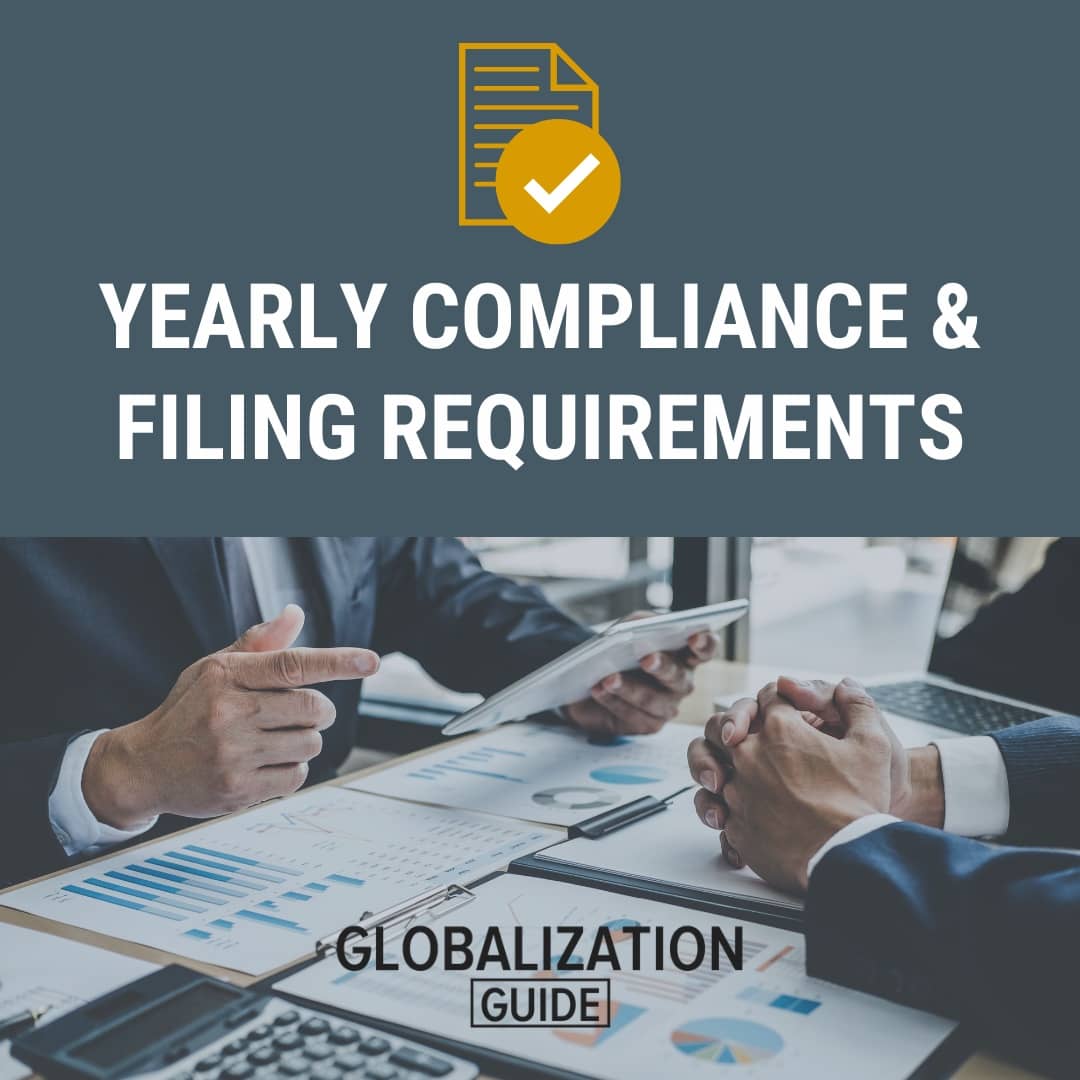“What documents do I have to file for my LLC” is one of the questions that we get asked the most. This article will focus on and discuss the yearly filing requirements for a single member, foreign-owned LLCs. Each state and the Internal Revenue Service, or commonly known as the IRS, has specific filing requirements for every type of business such as partnerships, corporations, limited liability companies (LLCs), and others. To avoid tax-related and legal problems, it is important to adhere to state compliance and IRS code when it comes to business classifications and requirements.
To discuss things in order, we will divide the filing requirements into two categories: (1) filings for the state and (2) filings for the IRS.
State Compliance Filings
Every state in the United States allows registration as a limited liability company or LLC. However, it does not end in registration, there are annual compliance filings that must be done. Here are the things you need to do:
- Maintain a registered agent
- File annual report
- Pay franchise tax
- Pay sales tax
Below is a detailed discussion for every requirement.
Registered Agent
LLCs are required to have a physical address in the state where they are registered. Foreign companies that are unable to satisfy this requirement themselves must designate a so-called “Registered Agent”.
This can be a natural persons residing in the state of organization.
If such a person can not be found, then the services of a professional registered agent must be obtained. The fees for this are usually in the range of 100$ to 250$, depending on the state and service provider. The fee is due once a year, usually around the anniversary of the LLC.
You can change your registered agent if you wish to. The recommended time for changing a registered agent is around four weeks before the anniversary of your company. The usual time of process for changing a registered agent is 1 to 14 days, depending on the state.
Annual Report
Requirements for filing an annual report vary widely from state to state. Here’s a guide for you.
First, determine if you need to file an annual report or not. Some states do not require an annual report, but most of them do. You can check this by looking up on the internet whether your state requires one or not. The annual report comprises updates to contact information, registered agent, members, or other things that the state might ask you to include.
Second, find out the due date of the annual report in your state. This could be found on the business filing website of your state. Some states require a report annually, others have a biennial filing, and some are even every 10 years. The due date depends on your state. Some states have a single due date for all reports, while in other states, the due date is on the anniversary of your LLC.
Third, complete the annual report form. The ways on how to complete the form vary per state. Most states allow you to fill out your annual report electronically through the state business filing agency website.
How to file?
As mentioned before, some states have their own website portals that allow you to fill out the annual report, most of those websites give you the option to file the annual report after completing it.
In case that is not available, the other way is to print the form from the website, fill it up and mail it to the address given by the state.
Take note that there are corresponding filing fees.
Here is our detailed guide for Florida LLC Annual Report: Step by Step Guide on How to File It Online.
What happens when you do not file?
Failing to file an annual report means your business is subjected to administrative and financial consequences. The penalties are different per state. But since you missed the deadline, you need to act fast to avoid further damages. If you missed the state’s deadline for the annual report, usually you pay for a late penalty fee and they set a second due date for your filing. This is often seen as a warning.
However, if you missed it again. Your business might face administrative consequences and might be dissolved. You need to have a good standing in your compliance with the state to avoid administrative dissolution. If your business gets dissolved, you cannot operate at all, unless you file for reinstatement.
Franchise Tax
Some states require you to pay a franchise tax. The most known states for this is Delaware and California. The amount of franchise tax varies per state. But here is what we know, Delaware Franchise Tax costs $300 per year and the due date is June 1st of each year. On the other hand, California requires LLCs to pay $800 per year for franchise tax.
What happens if I do not pay franchise tax?
The penalties for not paying franchise tax are different per state. However, the ideas are mostly the same and it is the dissolution of your business.
In Delaware, if you missed your payment for franchise tax, it will be on the record with the Delaware Division of Corporations. Even if you pay it, records of late payments will still be there. It means when someone researches your business, the missed payments will be in your company’s history. This might not be a good image for potential investors or lenders. Moreover, if you did not pay franchise tax for your LLC for three consecutive years, your business will be dissolved.
Sales Tax
Sales tax is levied by states or counties on business transactions. The state and local government requires not just LLCs but also other businesses to collect sales tax from customers and give the payment to the significant government agencies. To avoid penalties and legal problems, it is important that your business collects the correct sales tax rate from customers.
To calculate the correct rate for sales tax, the sales you need to consider are:
- Store Sales
- In-State Sales
- Out-of-State Sales
IRS Compliance
After the state requirements for LLCs, you also need to comply with the IRS guidelines to be able to continue operating and to avoid legal issues. The three primary filing requirements for a single member, foreign-owned LLCs are:
- Form 5472 and 1120
- FBAR
- Form 1040-NR
For a detailed discussion of every requirement, continue reading.


Form 5472 and 1120
Every foreign-owned US LLC is subject to an annual IRS information return. The information in the forms is regarding the reportable transactions of foreign LLC during the tax year.
This additional compliance procedure was introduced in 2017, in accordance with Sections 6038A and 6038C. The purpose of this is to give the IRS more information over who owns US LLCs, and what they are using the LLC for.
Take note that Form 1120 should now be attached to Form 5472 upon filing in accordance with the new regulations of Section 6038A.
If you want to learn more about Form 5472, you can read our Ultimate Guide to Form 5472 for Disregarded Entities.
When to File Form 5472 and 1120
The due date for filing Form 5772 and your company’s Form 1120 is April 15 of the next year, following the current tax year you will file. For an extension time to file, you may request by filing Form 7004.
Where to File Form 5472 and 1120
You may fax the forms to 855-887-7737 or mail them to:
Internal Revenue Service 1973 Rulon White Blvd M/S 6112 Attn: PIN Unit Ogden, Utah 84201
What happens if you fail to file Form 5472 and 1120?
A penalty of $25,000 will be demanded if an LLC:
- fails to file Form 5472 on the due date.
- fails to maintain records in accordance with Section 1.6038A-3
- files an incomplete Form 5472 on the due date.
The IRS will notify the LLC about the failure to file and the penalty. If the failure of filing Form 5472 pursues for 90 days after the IRS notification, another $25,000 will be added to the penalty.
If an LLC submits fraudulent and false information, criminal penalties under sections 7203, 7206, and 7207 may apply.
FBAR
Report of Foreign Bank and Financial Accounts or known as FBAR is only relevant for
- companies who own non-US bank accounts
- companies who have held more than $10,000 USD equivalent at one time in a foreign account during the reporting tax year.
FBAR is in compliance with Title 31 of the US Code.
When to File FBAR
The due date for filing the FBAR is April 15 of the next year, following the current year you are about to report. If you fail to file on the 15th of April, you have an automatic extension until October 15. Unlike Form 5472, you do not need to file an extension for FBAR.
How to File FBAR
The FBAR is not filed manually. You have to electronically file your LLC’s FBAR through the BSA E-Filing System of the Financial Crimes Enforcement Network.
If you wish to manually paper-file, you will need to request an exemption from e-filing. You may do so by calling FinCEN’s Regulatory Helpline at 1-800-767-2825 or (703) 905-3591.
Penalties
You might be subject to penalties for recordkeeping violations. The penalties according to US Code 5321 are as follows:
- Foreign Financial Agency Transaction – Non-Willful Violation of Transaction = $12,921
- Foreign Financial Agency Transaction – Willful Violation of Transaction = Greater of $129,210, or 50% of the amount per 31 U.S.C.5321(a)(5)(D)
- Negligent Violation by Financial Institution or Non-Financial Trade or Business = $1,118
- Pattern of Negligent Activity by Financial Institution or Non-Financial Trade or Business = $86,976
Form 1040-NR
Form 1040-NR or U.S. Nonresident Alien Income Tax Return is only necessary in the following cases:
- you are a nonresident alien engaged in trade or business in the United States
- were there is US source income, on which the required tax obligations have not been satisfied by withholding.
When and Where to File Form 1040-NR
If you are a non-US resident with a trade of business in the US, you must file your Form 1040-NR on the 15th day of the 4th month after your tax year ends. You will file it at the address stated in the form.
If you need an extension time to file, you must file Form 4868.
Penalties
Failure to file means you may lose your refunds. For serious tax problems, revocation or denial of Passport happens.
Summary
To sum everything up, if you are a non-resident in the US owning a single-member LLC, you must comply with state and IRS requirements which are the following:
State requirements:
- Maintain a registered agent
- File annual report
- Pay franchise tax
- Pay sales tax
The due dates vary in each state, so make sure to check it on your state’s website.
IRS requirements:
- Form 5472 and 1120
- FBAR
- Form 1040-NR
The deadline for filing the mentioned requirements are every 15th of April after the tax year to be reported. Failure to do so has penalties and consequences.
Join Our Private Facebook Group
Connect with like-minded entrepreneurs and global citizens.
Get first access to our newest, actionable advice and offers.

